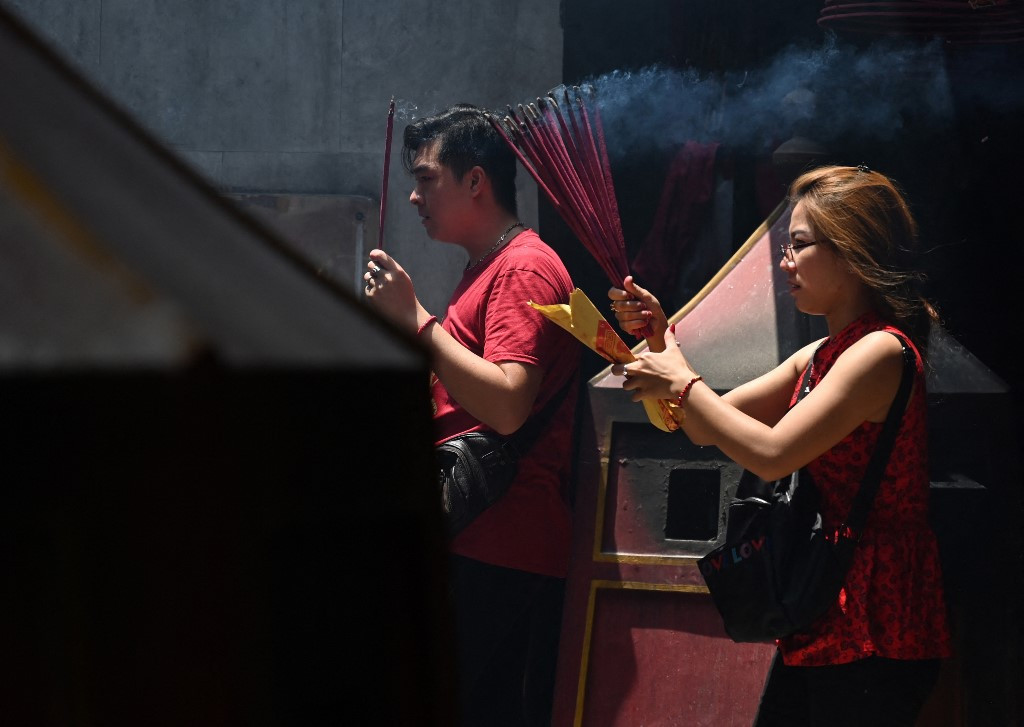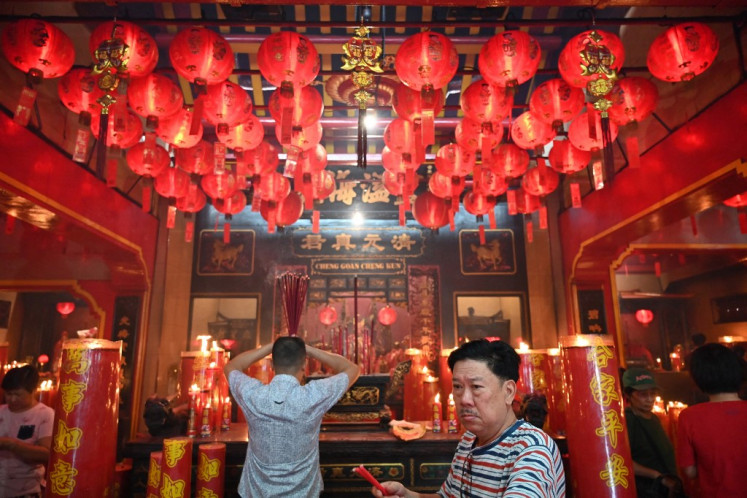Popular Reads
Top Results
Can't find what you're looking for?
View all search resultsPopular Reads
Top Results
Can't find what you're looking for?
View all search resultsThe changing face of Chinese-Indonesian identity
Many young Indonesians of Chinese descent find their multicultural identities a constant balancing act.
Change text size
Gift Premium Articles
to Anyone
B
eing Chinese-Indonesian today can be confusing. I look noticeably Chinese, I celebrate Chinese New Year with my family and I used to get angpao, or red envelopes filled with money, as a kid. But I also grew up in a household where my parents conversed more in Javanese than in any other language. I don’t speak any Chinese dialect and was given a very Javanese-sounding name. As a result, I’m often unsure of where I fit in culturally.
This is a dilemma that a number of young Chinese-Indonesians are familiar with, as many shed much of their Chinese identity and become “assimilated”. According to the 2010 census, only 24 percent of Chinese-Indonesians still use Chinese as their home language.
Some Chinese-Indonesians see this as a good thing. Laurensia Felise, a 22-year-old newspaper reporter from South Tangerang claims that “being less Chinese” allows her to blend in with other Indonesians and relate with others more easily. This is a sentiment echoed by Mychel Pancho, a 30-year-old writer from Cengkareng, West Jakarta. “You get to blend in with everyone more,” he said, “and there’s less chance of you being racially discriminated against.”
Some even see this change as inevitable and necessary. Alva Christo, a 25-year-old Yogyakarta-born photographer who is more fluent in Javanese than Mandarin believes that people should follow the customs of the area they live in. “A lot of rifts between Chinese-Indonesians and locals were caused by language barriers,” he said. “I mean, it’s important to learn the Chinese language, but I won’t be able to use it when I haggle at the local markets.”
There seems to be a consensus among Chinese-Indonesians that some Chinese traditions are outdated and impractical, even among those who come from a fairly traditional Chinese background.
Jeffry Kurniawan, a 22-year-old college student from Surabaya, East Java, is better known as Atat (from his Chinese name, Tan Liong Tat). He comes from a traditional Hokkien family and still speaks the language at home. His family believes that during Chinese New Year, one shouldn’t get a haircut – it would shed good luck – and that the house must always be cleaned to bring positive energy into one’s living space. His family also looks for “lucky dates” on the Chinese calendar before setting up a new business.
Despite his background, Atat sees little room for Chinese traditions in the modern world. “The traditions are becoming a burden and are slowly disappearing,” he says. “They’re getting irrelevant, and I can’t see their place in today’s world.”
However, not every young Chinese-Indonesian shares the same feelings. Some regret having left traditions behind. Mychel said he had missed out on a lot of his ancestors’ customs and culture. “At my wedding, we didn’t do any specific traditional customs because our family had forgotten how to do the procedures,” Mychel remembered. “I regret that a bit.”
Forced to hide
Under the New Order regime, starting in 1966, Chinese-Indonesians were under a lot of pressure to prove their belonging in Indonesian society. In an effort to “assimilate” Chinese-Indonesians, Soeharto introduced policies that eradicated pillars of Chinese culture in Indonesia: Chinese organizations, Chinese language schools and Chinese media.
Teaching and learning Chinese, as well as distributing materials in the language, was banned. Those who attended Chinese language schools were forced to join national schools. Chinese-Indonesians were also instructed to change their names into Indonesian-sounding ones, forcing them to lose their traditional family names. Chinese traditions were effectively banned for about 35 years.
Chinese-Indonesians make offerings at a temple in Jakarta on February 19, 2019 to mark the Cap Go Meh Festival. (AFP/Bay Ismoyo)The anti-Chinese policies were ended by former president Abdurrahman Wahid or “Gus Dur” in 2000, but the damage was done.
The repressive policies, the anti-communist and anti-Chines propaganda during those years and, of course, the 1998 riots in which Chinese-Indonesians were targeted, killed and raped have brought fear and trauma into the minds of many Chinese-Indonesians when it comes to our identity.
For better or worse, the majority of Chinese-Indonesians had to become Indonesia-oriented. According to sinologist Leo Suryadinata, although the majority have lost the command of Chinese languages, many Chinese-Indonesians still have some degree of Chinese culture and identity. “Some have lost their Chinese roots, but others are interested in rediscovering theirs,” Leo said, “But this does not mean they have been transformed into mainland Chinese again; they are still Chinese-Indonesians.”
Leo sees Chinese-Indonesian culture as a hybrid between local and Chinese culture (mainly its modern incarnation). “It will be some sort of Peranakan-type culture but with modern cultural input, including Chinese culture,” he said, “Some young Chinese-Indonesians may learn Chinese again, but it will not be their first language.”
Compared to previous generations, young Chinese-Indonesians are more integrated into Indonesia’s majority culture and are thus generally more accepted by non-Chinese-Indonesians. “They consider themselves stakeholders in Indonesia, and that’s a good sign,” Leo said, “The majority of Chinese-Indonesians will continue to live in Indonesia, and I hope they continue to make contributions to Indonesia.”
Daniel Mananta, popularly-known as VJ Daniel, is one of the few popular Chinese-Indonesian celebrities. Here he is seen hosting the TV show Indonesian Idol. (AFP/Oeday Abdullah )Looking ahead
Chinese-Indonesians have always been heterogeneous groups with different beliefs and various degrees of connection to Chinese cultures. As younger Chinese-Indonesians have children, it is uncertain how the culture will evolve, but it will likely not be of a single voice.
Daniel Mananta, a 39-year-old actor and entertainer, is passing on some of his Chinese traditions to his two half-Chinese-Indonesian children. When they got married one day, he said, the family would likely perform a traditional Chinese tea ceremony with older family members as an expression of gratitude. He has also given his children Chinese names and calls his daughter Cici—a Hokkien word for older female siblings—a common way to address Chinese-Indonesian women in Indonesia.
However, he has chosen not to treat to the practices with the same intensity as older relatives. “I don’t mind traditions like the lion dance or the angpao; they’re fun and the kids love them,” he said, “but the heart behind it has to be right. You do it because you want it to be festive and not out of guilt or fear of not getting any blessings if you don’t.”
“I’m more interested in Indonesian cultures, as opposed to just Chinese cultures,” he added. “I am not a Chinese person who happens to live here; I am an Indonesian with Chinese blood.”
Former Jakarta governor, Basuki Tjahaja “Ahok” Purnama, has a pragmatic approach when it comes to the cultural identity of his children. While he has placed his children in Mandarin courses, he said it was done out of necessity. “At home, my children are exposed to Khek [a dialect of Hakka spoken in Belitung, Ahok’s hometown], and it’s similar to Mandarin,” Ahok said, “So it makes sense that they learn it. After all, Chinese will be the second-most important language in the world.”
Chinese-Indonesian governor Basuki Tjahaja Purnama gestures to his supporters at his final campaign rally prior to the gubernatorial election in Jakarta on February 11, 2017. (AFP/Goh Chai Hin)At 59 and with his political background, Ahok has more experience than many about the sensitive nature of Indonesia’s relationship with Chinese-Indonesians. He explains that while history can’t be changed, Indonesia is learning as a nation. “We’re still figuring it out,” he said. “After hundreds of years, even [groups within] the United States are still fighting each other.”
Ahok went on to highlight the progress that Indonesia had made in its acceptance of people of Chinese descent. “Let’s be honest, we used to not even be allowed to learn our own language,” Ahok added. “There’s no way I could have been a regent or a governor back then,” he said with a chuckle.
Cultural identity is undoubtedly a complex matter, but acceptance seems to be the key to moving forward. Being connected to your ancestry helps you understand yourself better and where you come from.
Carissa Atrianty, who is of Javanese and Chinese ancestry and whose grandparents migrated directly from Xiamen, China, acknowledges that she wasn’t interested in her Chinese heritage when she was younger but now chooses to embrace her ancestral cultures as a way of appreciating the hardship they had to go through emigrating to a foreign country. “Connecting with Chinese culture can be as simple as appreciating the cuisines, carrying out a wedding tradition or learning to speak the language,” Carissa said. “Knowing you’re a part of something not originally from this country, something bigger, something of a cultural shift, is a huge privilege, and you should embrace it.”













